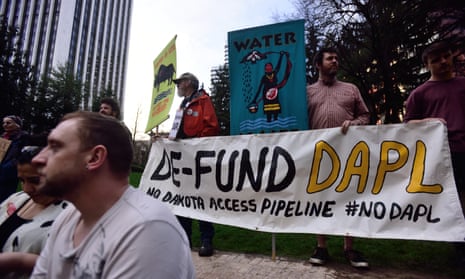The financial giant ING has sold its stake in the $2.5bn loan financing the Dakota Access pipeline, the latest victory for the anti-pipeline divestment campaign that comes as the project is set to begin transporting oil.
The Dutch banking and financial services company is the first of a group of 17 banks to divest from the loan that financed the project. ING’s share in the loan was $120m.
The buyer of the loan was not disclosed. Under the terms of the sale, ING will retain some of the risk in the event of default.
ING’s decision followed a 10 February meeting with the Standing Rock Sioux tribe, which argued that the pipeline’s route – crossing under the Missouri river just north of the tribe’s reservation – threatened its water source and violated its treaty rights.
“We are heartened that ING has made the conscience decision to remove itself from a project that tramples on the rights of sovereign nations,” the Standing Rock Sioux tribal chairman, Dave Archambault, said in a statement.
ING’s divestment from the loan follows a series of efforts to influence the pipeline company, the bank said in a statement. ING had previously sold about $220m of shares in the pipeline’s parent companies and decided not to do any future business with the companies.
“We are not able to halt the project, and we never were,” ING said in a statement. “Being a lender to the project, we first tried to engage and use any influence we may have to encourage a satisfactory outcome for all parties involved. However, there was even less room for lenders to positively influence the project after construction had been resumed by the client once the permits had been granted.”
Opposition to the pipeline, which is slated to carry crude oil from the Bakken oil fields in North Dakota to a refinery in Illinois, has become a global rallying cry for indigenous and environmental groups. Thousands of activists, who called themselves water protectors, travelled to the site of the disputed river crossing in 2016, establishing spiritual encampments and violently clashing at times with pipeline security and law enforcement during attempts to slow or halt construction.
But a major victory for the tribe during the final weeks of the Obama administration – the denial of a key permit to drill under the river – was reversed soon after Donald Trump’s inauguration.
Construction recommenced on 7 February and the pipeline company said in heavily redacted court documents on Monday that it “believes that oil may flow sometime this week”.
Pipeline opponents also targeted the project’s banks and investors, organizing global actions under the banner #DefundDAPL. The divestment campaign has racked up a series of victories even as the tribe’s legal efforts to halt the pipeline have been stymied.
Last week, Norwegian pension fund KLP announced its sale of $58m worth of shares in the pipeline companies, following the lobbying of the Sami, an indigenous people living in the far north of Norway.
Other Norwegian financial institutions, including private investor Storebrand, bank DNB, and mutual fund Odin Fund Management, have also sold their shares in the pipeline’s parent companies.
In February, the city of Seattle voted to divest from Wells Fargo, another of the banks involved in financing the project.
With oil set to begin flowing under the Missouri river within days – the US court of appeals for the District of Columbia denied a request for an emergency reprieve on Saturday – the divestments are unlikely to have a concrete impact on the Dakota Access pipeline itself.
But campaigners hope that their continued pressure on the financial sector will pay dividends when future pipeline projects, such as the revived Keystone XL pipeline, seek funding from banks and investors.
“We are working to make these kinds of infrastructure projects as toxic as they really are,” said Jason Schwartz, a spokesman for Greenpeace. “We have to make these projects toxic to the finance sector.”
“Keystone XL is going to be looking for a project loan,” he added. “So that’s going to be a primary target for us – pre-empting that project loan.”








